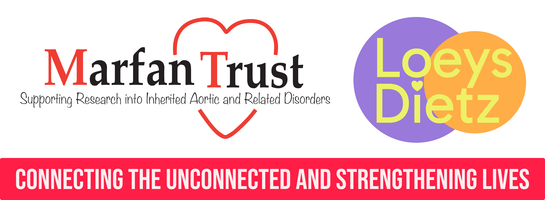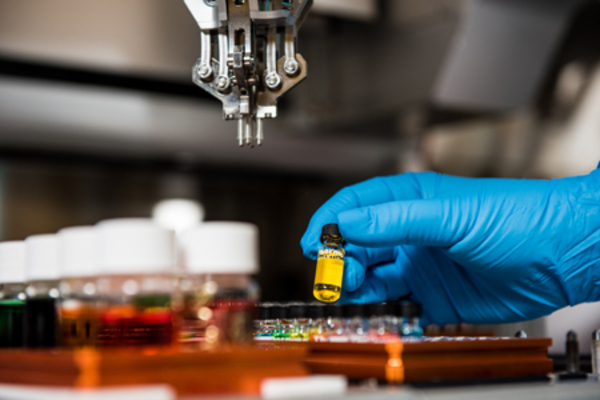Since it was founded, the Marfan Trust has:
Funded the establishment and running of the Sonalee Laboratory dedicated to research into Marfan syndrome; first at St George’s University, London, then from 2020 to 2022 at the Guy Scadding Building hosted by Imperial College, London. The laboratory now divides its time between two prestigious establishments: the William Harvey Research Institute at Queen Mary University of London and the Institute of Ophthalmology, London.. The Sonalee Laboratory carries out the research programme of the Marfan Trust both alone and in collaboration with partner organisations;
Established the first UK laboratory to provide research reports of 100 gene mutations. As a result, a diagnostic test is now offered through the NHS, and available to everyone in the UK;
Formed an international consortium to identify the Marfan gene (fibrillin-1) in 1991, permitting family screening for the first time. This is now an internationally used standard diagnostic tool. The Trust also funded a research fellow who made a major contribution to the discovery of fibrillin-1;
Co-funded the successful six year Aortic Irbesartan Marfan Study (AIMS) trial together with British Heart Foundation and the Marfan Association. Results showed that the drug Irbesartan is best for children and adults for maintaining aortic wall strength. This should increase survival rates and lengthen lifespan for patients of all ages. Positive results were published in The Lancet in December 2019;
Discovered new genes for each of Ectopia Lentis (EL), Scoliosis and Familial Aneurism (LMOD 1). The EL gene has been published and the Scoliosis and Familial Aneurism genes were submitted for publication in 2020. These discoveries will help distinguish these conditions from Marfan syndrome:
Established a national UK research database of patients and families which provides vital data for current and future ethically approved research projects;
Helped set up 24 national regional Marfan clinics in the UK, now in major NHS hospitals to provide local diagnosis, management and care so people do not need to travel long distances;
Provided a helpline for national and international enquiries from patients, family members, doctors, dentists, referring physicians and paramedical personnel. The helpline provides rapid access to specialised knowledge regarding medical and surgical care;
Held regular conferences for patients to update them on the latest research;
On an annual basis, teach three summer medical studentships and four BSc/MSc students on laboratory research so more future medical professionals understand and are aware of Marfan syndrome. In addition, the students increase scientific knowledge about Marfan syndrome as they contribute to academic publications;
Hosted more than 9 successful PhD students since 1993 studying glaucoma, Marfan syndrome, dislocated lenses, adolescent spinal curvature, familial ascending aortic aneurysm and dissection. As a result, these overlapping conditions can be differentiated from Marfan syndrome, enabling clearer diagnosis and specific treatment;
Raised £120,000 per year from donors to provide research, education and awareness of Marfan syndrome. This has funded salaries, consumables, website, publications and media costs, conferences and the helpline; and
Provided research updates and practical advice via multiple communications: two paper newsletters a year plus frequent e-communications and social media posts, educational publications and videos to 5,000 plus supporters.
Published 170 papers in scientific journals and chapters in books, and presented the Trust’s work at international conferences where the scientific community comes to debate and share ideas. Conferences include those run by: the American Society of Human Genetics [ASHG], the Association for Research in Vision and Ophthalmology [ARVO], the Marfan Related International Research Symposium, and the International Congress of Human Genetics [ICHG].
Amalgamated the Marfan Association's (MA) Legacy from 2019, adding 500 plus new supporters to the Trust. The MA sadly had to close down in 2019.
Current and future research projects include:
Studying cells from patients to test new medications to improve fibrillin protein production
A collaboration with Cambridge University to find out what medications may be even more effective in preventing aneurysms;
Publishing the Marfan genotype – phenotype correlations
This project will enable us to work out how the position and type of gene error can predict the severity of Marfan syndrome and therefore guide patients and doctors on how to better manage treatment;
Discovering new genes for Familial Thoracic Aortic Aneurysm and Dissection (FTAAD)
A UK collaborative project leading to clearer diagnosis and more specific care, as well as family screening;
Searching for new genes for Ectopia Lentis (EL)
A European collaborative project that enables doctors to distinguish EL from Marfan syndrome; two new genes have been published;
Publishing two Adolescent Scoliosis genes
A collaboration with University of Montreal Canada which will allow for correct genetic counselling and distinguishing Scoliosis from Marfan syndrome; the first two genes have been published;
Creating zebrafish models of structural genetic aortic disease
Heart disease genes will be introduced into transparent fish so the development of an aneurysm can be observed. This will lead to better understanding of how aneurysm genes produce abnormal development;
Searching for modifying genes for Marfan syndrome
This collaborative project will enable finding minor genes which alleviate the effect of the Marfan gene to be harnessed to improve the condition;
Using whole genome sequencing to discover new genes for Ehlers Danlos syndrome (EDS)
EDS overlaps with Marfan syndrome. This process will allow us to differentiate EDS from Marfan syndrome and provide correct management; hEDS has no known genes at present. Families are under active investigation; and
Surveying the of quality of life for young people with Marfan syndrome
Physical and psychosocial impact of Marfan syndrome on lifestyle needs to be better and more widely understood. We are preparing a state-of-the-nation snapshot survey to be taken of the physical and psychological manifestations of Marfan syndrome.
Elsewhere in the world, an exciting research project is unfolding: 101 Genomes.
The Marfan Trust was proud to present Romain Alderweireldt and Ludivine Verboogen's project 101 Genomes which researches protective modifier genes that counter the cardiovascular implications of Marfan syndrome. This project was inspired by Romain and Ludivine's son, as well as the maverick spirit of PEARS pioneer, Tal Golesworthy. Here is the link to their website: https://www.101gems.be/site






